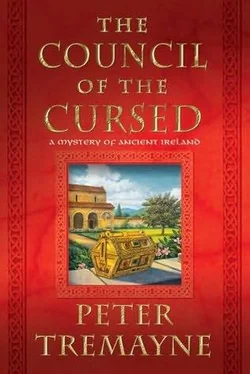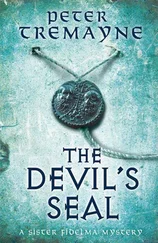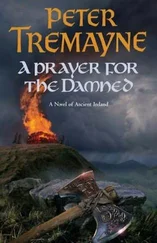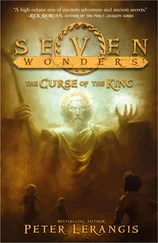Peter Tremayne - The Council of the Cursed
Здесь есть возможность читать онлайн «Peter Tremayne - The Council of the Cursed» весь текст электронной книги совершенно бесплатно (целиком полную версию без сокращений). В некоторых случаях можно слушать аудио, скачать через торрент в формате fb2 и присутствует краткое содержание. Жанр: Исторический детектив, на английском языке. Описание произведения, (предисловие) а так же отзывы посетителей доступны на портале библиотеки ЛибКат.
- Название:The Council of the Cursed
- Автор:
- Жанр:
- Год:неизвестен
- ISBN:нет данных
- Рейтинг книги:4 / 5. Голосов: 1
-
Избранное:Добавить в избранное
- Отзывы:
-
Ваша оценка:
- 80
- 1
- 2
- 3
- 4
- 5
The Council of the Cursed: краткое содержание, описание и аннотация
Предлагаем к чтению аннотацию, описание, краткое содержание или предисловие (зависит от того, что написал сам автор книги «The Council of the Cursed»). Если вы не нашли необходимую информацию о книге — напишите в комментариях, мы постараемся отыскать её.
The Council of the Cursed — читать онлайн бесплатно полную книгу (весь текст) целиком
Ниже представлен текст книги, разбитый по страницам. Система сохранения места последней прочитанной страницы, позволяет с удобством читать онлайн бесплатно книгу «The Council of the Cursed», без необходимости каждый раз заново искать на чём Вы остановились. Поставьте закладку, и сможете в любой момент перейти на страницу, на которой закончили чтение.
Интервал:
Закладка:
‘It was not a debate but an assembly where delegates could meet before the start of the working sessions. My quarrel was with Cadfan the Briton,’ asserted the bishop.
‘So you have no idea why Abbot Dabhóc would call at your chamber in the middle of the night?’
‘None whatsoever, unless he was inveigled there by the Welisc who killed him, to lay the blame on me. That is my belief.’
‘You dislike Abbot Cadfan very much, I hear?’
‘They are all the same, these Welisc . They are enemies of my blood. Whining and ungrateful.’
‘Isn’t that understandable?’ asked Fidelma.
Bishop Ordgar jerked his head towards her and his eyes narrowed angrily.
‘What do you mean?’
‘It is not so many years ago that your people crossed the seas and began to drive out the Britons, whom you call “foreigners”- Welisc in your language-from their lands and began to settle on the farms and the villages from which they had been dispossessed. Even now you continue to drive them westward. Do you expect gratitude and kindness from them?’
Bishop Ordgar’s lip curled arrogantly. ‘God showed us the way to the island of the Britons and gave it to us to inhabit.’
‘But it was inhabited already.’
‘Inhabited only by sheep. God would not have made the Welisc sheep if He did not expect them to be shorn.’
‘They have not been shorn so easily,’ Fidelma observed. ‘They still fight for the possession of their lands.’ It was clear that she had no liking for the bishop. ‘If it was God Who showed your people the way, Ordgar of Kent,’ she continued, ‘then He came in a strange disguise. At the time, it was Woden, Tyr, Thurnor and Freya whom you worshipped. You see, I know of your gods, for many of your people worship them still. A generation or two ago, none of the Angles and Saxons knew or cared of the Christ until the missionaries from my people raised you from your idols. Do not blame God nor Christ as the reason why you continue to persecute and dispossess the Christian Britons.’
Brother Ordgar swallowed hard. He was trying to think of some suitable retort when Fidelma turned to Eadulf. Out of courtesy she continued to speak in Latin.
‘We need not trouble Bishop Ordgar nor Brother Benevolentia further…at this time.’
Eadulf was confused. His mind was actually turning over the truth of what Fidelma had said because he himself had worshipped Woden into his teenage years before a wandering missionary from the land of Hibernia converted him to the New Faith. He realised Fidelma was turning for the door and glanced quickly back.
‘We have finished for the moment,’ he said hastily.
‘Wait!’ Bishop Ordgar called, as Eadulf was about to follow Fidelma. ‘I need to be cleared of these foul accusations at once. When am I to be allowed to resume my seat at the council?’
It was Fidelma, in the doorway, who turned back to him.
‘When we have finished our enquiry, Bishop Ordgar of Kent,’ she replied curtly. ‘You will be informed when that is, have no fear.’
Eadulf followed her as she paced rapidly down the corridor. They found themselves in a tiny hallway at the end where there was a large window. It overlooked a small courtyard with a little flower garden and splashing fountain. There she paused, leaning on the windowledge and slowly breathing in the fresh air.
‘I am sorry, Eadulf,’ she said, feeling him standing behind her and knowing he would be looking at her with a reproachful gaze. ‘Something about that man and his arrogance causes my ire to rise. I should not have spoken so harshly about your people and their history.’
‘I am not oblivious to their faults,’ acknowledged Eadulf. ‘There are no people on the face of this earth who are possessed of all the virtues. Our storytellers say that our forefathers were being driven from their own lands by hostile tribes, and that is why they crossed the sea to Britain and fought the natives for the right to settle there.’
‘Good for your people, but hard for the Britons who were dispossessed.’
Eadulf sought to change the subject. ‘So you think Bishop Ordgar might be guilty of this crime?’
‘It is certainly a weak story that he has to tell. But in its very weakness the truth might lie. Overall, it is too curious a story to be made up.’
‘What of the young man, Brother Benevolentia?’
‘He seems in awe of Bishop Ordgar and will do what his master tells him.’ Fidelma straightened up from the windowledge and saw that Eadulf was looking gloomy. ‘It is early days yet,’ she smiled.
Brother Chilperic’s directions were easy to follow.
When they entered Abbot Cadfan’s chamber, in response to his invitation, the Briton came forward with an outstretched hand and clasped first that of Fidelma and then that of Eadulf. He was short, with dark hair, and his black eyes seemed devoid of pupils, for the colours appeared to merge together, making one large orb in each socket.
‘I know of you, Fidelma of Cashel,’ he said animatedly. ‘I was at the court of Gwlyddien of Dyfed when you and Brother Eadulf came there and solved the mystery of what happened at Pen Caer. I am glad that you are here. If there is any who can solve this matter, then it is you.’
‘Pen Caer was some time ago.’ Fidelma gave a deprecating smile. ‘I only hope that we can fulfil your expectations.’
‘What happened in the kingdom of Dyfed has often been told at the feasting fires even in the northern kingdom of Gwynedd. But come, be seated, let me offer you refreshment.’
It was certainly a better reception than that given them by Bishop Ordgar. The pair seated themselves and accepted his wine. It was white, cool and refreshing.
‘Now,’ the Briton began in businesslike fashion, ‘I know that I am accused by Ordgar of killing poor Abbot Dabhóc. So please ask your questions and I will tell you what I know as facts.’
Fidelma felt comfortable with Cadfan’s easy manners and recalled that the Britons had a similar law system to those that the Brehons used. She reminded herself that among the Britons there was an office called a Barnwr that was their equivalent of a Brehon.
‘Let us start off by asking you when you first met Bishop Ordgar. It would be useless asking you if you disliked him.’
Abbot Cadfan chuckled in genuine amusement.
‘Dislike would be too mild a term.’ He paused reflectively. ‘Though that admission will do me no good in an investigation such as this. Anyway, the truth is the truth. If he were lying in need of help on the far side of a road, I could not bring myself to emulate the story of the Good Samaritan. Perhaps I do not have sufficient faith in the Christ. But to answer your question, I had no idea of Bishop Ordgar’s existence until I arrived here in Autun. We first encountered each other outside the council chamber and I told him that when the council met, I was going to raise a proposition that they should begin by censuring the Saxon kingdoms for the wanton destruction of Benchoer.’
Seeing that Fidelma and Eadulf looked blank he continued: ‘Benchoer is the largest and greatest of our religious houses in Gwynedd. Drostó, the abbot, was invited to this council; I was to come along as his assistant. Just before we commenced our journey, the Saxons of Mercia attacked and burned Benchoer and slaughtered nearly a thousand of our brethren there. I was not present at the time, thanks be to God, for I had gone to consult with the bishop of Dewi Sant in Menevia about matters that needed to be raised at this council. We heard that Drostó and a few survivors had fled into the forests and were being pursued by the Saxons. Then we had a message from Drostó himself, saying that he could not desert his people at such a time. So it was agreed that I should come here as representative because this council was too important to ignore. The proposals being debated here might greatly affect our churches and abbeys.’
Читать дальшеИнтервал:
Закладка:
Похожие книги на «The Council of the Cursed»
Представляем Вашему вниманию похожие книги на «The Council of the Cursed» списком для выбора. Мы отобрали схожую по названию и смыслу литературу в надежде предоставить читателям больше вариантов отыскать новые, интересные, ещё непрочитанные произведения.
Обсуждение, отзывы о книге «The Council of the Cursed» и просто собственные мнения читателей. Оставьте ваши комментарии, напишите, что Вы думаете о произведении, его смысле или главных героях. Укажите что конкретно понравилось, а что нет, и почему Вы так считаете.











